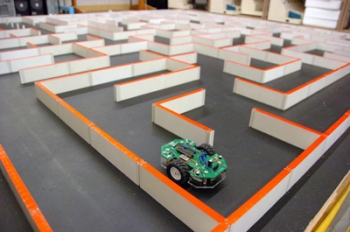The University of Nevada, Reno team consisting of Eric Chalko and Alexander Bajenov had spent months on the design and construction of Nevada Blue, a palm sized mouse.
The micromouse completed the run through the maze in 22 sec, just 2 sec ahead of the second place winner, University of Hawaii, Manoa and thus won the MicroMouse competition on April 23, 2011. Ten other teams also took part in the competition that featured diminutive robotic vehicles constructed and programmed by electrical engineering students. The California State University came third with a timing of 49 sec.
 Nevada Blue
Nevada Blue
According to Mehdi Etezadi, who is the Chair of the Electrical and Biomedical Engineering Department, the maze was filled with plenty of complex twists and turns, which was negotiated by the micromouse easily. However, it was not able to achieve high speeds and thus got a good lead over other competing vehicles. He mentioned that the students have done an amazing job in winning the first place in the competition.
Participants were not allowed to know the maze layout before the competition. The vehicle has to use its sensors, controllers and the computer chip to determine and memorize the way to the middle of the maze measuring 12x12 foot with gaps and walls. The mouse can travel through the maze a number of times within the specified 10 minutes and its quickest time from start to finish will be taken into account.
The micromice include sensors and mini motors for a drive system and the computer chip, which is programmed, acts as a decision maker guiding it through the maze. Etazadi revealed that this was a complex autonomous robot without any remote control. It took a lot of skills in control systems and creative programming for designing the mouse so that it would find its way to the heart of the maze. He said that their team of students had created an amazingly smart mouse.
In another contest, the MicroMouse packaging was judged based on the size, audible noise, thermal dissipation, weight, power consumption, reliability, electromagnetic compatibility, and design and product appearance. Here too, the University of Nevada, Reno team won the first place. The spring conference also saw one more competition such as the Student Design Project Contest and the Institute of Electrical and Electronics Engineers Student Paper Contest that provided an opportunity to undergraduate IEEE students to enhance verbal and written communication skills. The University of Nevada, Reno’s biomedical and electrical engineering students contested and won the competitions.